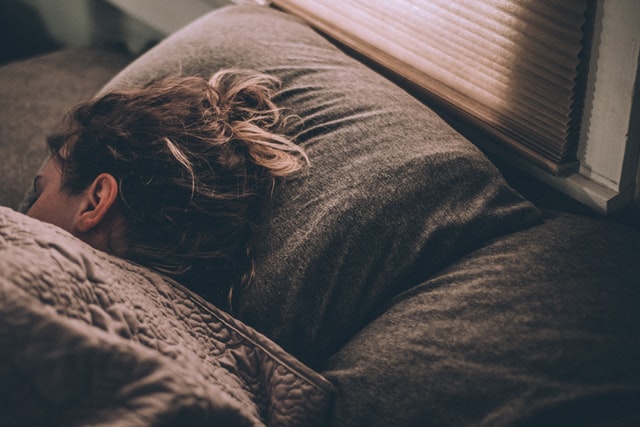When you’re sleep-deprived, it can get in the way of many things, including work. Getting great sleep requires doing a few things right and avoiding actions that will make restful sleep harder to come by. Here are seven tips for getting consistent, high-quality sleep.

Image via Unsplash
1. Exercise After the Workday
Exercising is obviously healthy, but it is particularly beneficial to getting good sleep.
It can relieve tension in the body, especially if you’re an office worker who is mostly sedentary sitting at the PC for many working hours.
Be sure not to overdo exercise by exerting yourself too much. This can re-energize you and keep you awake. Following on from that point, avoid exercising too late in the evening. It won’t allow your body to slow down enough before hitting the hay.
2. Avoid Eating or Drinking Too Much
Overeating or consuming a heavy meal late in the evening causes your body to work harder to begin the digestive process. It can also lead to a more interrupted sleep pattern due to waking up to use the bathroom halfway through the night.
Eating lighter, not consuming too many liquids, and doing so earlier in the evening gives your body the chance to complete its necessary processes sooner. As such, you’re less likely to need a bathroom break at 3 AM.
3. A Sleep Drink May Help
Missing out on essential minerals can cause trouble with recovery and sleep.
Taking a sleep drink shortly before bedtime that includes essential minerals can be restorative both to the mind and body. The use of L-Theanine in this type of drink is useful because it can encourage your mind to slow its pace, so restful sleep is easier to obtain.
4. Cut Back on Smoking
Smokers often use nicotine for stress relief. However, it’s also a stimulant too. Because of this, it’s best to abstain for several hours before going to bed to avoid remaining too awake to get a good night’s rest.
5. Stop Drinking Coffee or Soft Drinks Earlier
Coffee is a stimulant because the caffeine in it will keep you awake. It has a half-life of several hours, so the effect is longer lasting than you might realize. Make it a rule to avoid consuming coffee in the evenings, so the effect of the caffeine has time to dissipate before bedtime.
Soft drinks are also a concern too. They usually include a certain amount of caffeine in them – less than coffee – which might not be immediately obvious.
6. Reduce Noises
A noisy household or external sounds can keep you awake or prevent a deep REM sleep.
Use noise dampening curtains to reduce external sounds. Also, let anyone in the household know when you’re going to bed, so people can try to be quieter after that time. As a last resort, earplugs can reduce any remaining sounds like creaking floorboards.
Ensure your bedroom is dark enough. Any light source when trying to sleep well can be a distraction for the brain.
7. Listen to a Relaxing Soundtrack
Winding down is important to get the body ready for a long period of sleep.
Listening to nature soundtracks such as leaves rustling, rainstorm recordings, or melodic easy listening recordings are effective in calming the mind. YouTube and YouTube Music have many of them.
Using an app with a prerecorded selection of relaxing audio is useful too – Calm Radio and Tinnitus Calmer are particularly good.
Lastly, sticking to a set sleep pattern is beneficial to get the body used to sleep at a consistent time every night. It even helps on weekends if you can manage it too.
